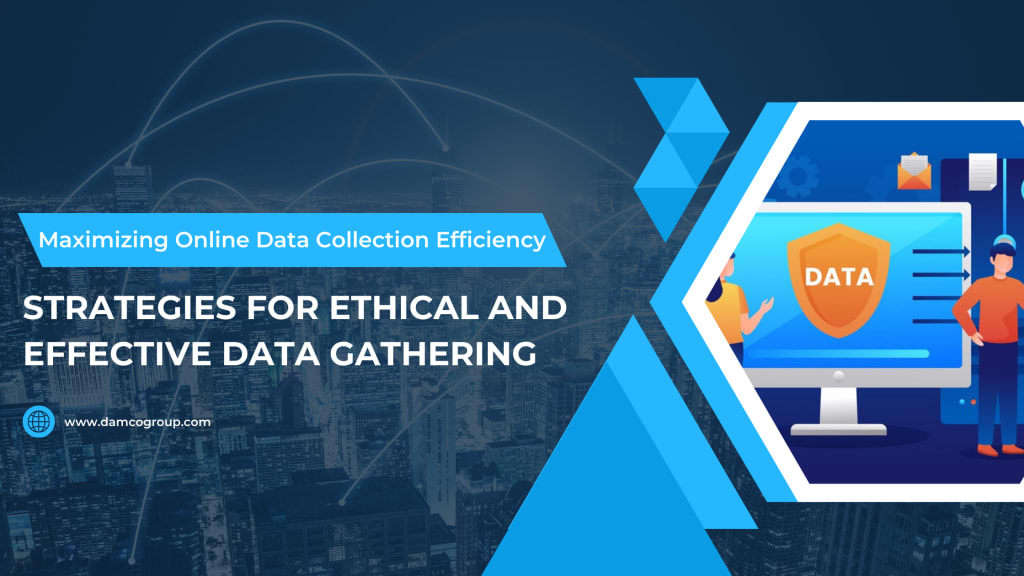Maximizing Online Data Collection Efficiency: Strategies for Ethical and Effective Data Gathering
Online data collection offers great opportunities for businesses to gather valuable insights into various phenomena. Read the blog to understand tips and tricks for data collection.

Ranging from market research to academic studies, online data collection has become a crucial part of multiple industries. The technique enables businesses and researchers to collect important insights into customer behavior, preferences, and trends. It involves everything from identifying pertinent data sources to storing the data securely for business purposes. Nevertheless, navigating the domain of online data collection can be challenging, considering concerns about ethics, data quality, and privacy. In this article, we'll understand online data collection and important tips and tricks for collecting high quality data effectively.
Online Data Collection and its Significance
Online data collection is the process of gathering information from groups or individuals utilizing digital platforms such as social media, websites, mobile apps, and surveys. It makes use of a wide range of methods, including interviews, surveys, web analytics, and observation. The data gathered can be quantitative or qualitative, based on the research objectives.
Here are some key reasons that make data collection important:
- It makes way for data-driven decision making based on evidence instead of assumptions
- It highlights problematic areas that require improvements or untapped opportunities
- It drives modern technologies such as machine learning, analytics, and AI
- It reveals market and customer trends that would otherwise go unnoticed
- It offers key performance indicators to monitor progress towards business goals
Important Tips for Successful Online Data collection
Establish Your Goals
It is important to establish your research goals clearly before investing in data collection efforts. Consider the insights that you are looking to gain. It will be easier for you to create tools and techniques for online data collection if you understand what your objectives are.
Select the Right Method
Choosing the right methodology is crucial to getting accurate data. Assess which approach—qualitative or quantitative—is more suited to achieving your research objectives. While focus groups and interviews offer in-depth qualitative insights, surveys are excellent for collecting massive amounts of quantitative data.
Focus on User-Friendliness
Make user-friendliness your top priority while developing questionnaires, interview guides, or surveys. To reduce respondent fatigue and guarantee accurate data collection, make sure your questions are relevant, clear, and concise. To collect relevant data and personalize the survey experience, use Skip Logic and Branching.
Preserve the Security and Privacy of Your Data
Considering the growing concerns about data privacy, it is important to prioritize the security of participants' information. Utilize encryption and secure protocols to safeguard data during transmission and storage. Before collecting any data, make sure participants are aware of your data handling practices and provide their informed consent.
Reach Your Target Audience
Knowing your target audience and reaching out to them is vital for obtaining representative data. Boost participation rates among your target demographic by partnering with relevant communities, using social media outreach, and running tailored advertising.
Encourage Participation
To promote involvement and increase response rates, consider providing incentives to participants. This could include gift cards, discounts, or entry into prize drawings. But make sure that your incentives are appropriate and do not unduly influence the responses of participants.
Pilot Test Your Instruments
Prior to launching your data collection efforts on a larger scale, it is beneficial to pilot test your instruments with a small sample of participants. This will allow you to identify any potential problems with the survey layout or wording and make required changes before deployment.
Monitor the Quality of Data
To guarantee reliability and accuracy, it is vital to monitor the quality of data throughout the process of online data collection. To identify and remove inconsistent or incomplete responses, implement validation checks. It is important to regularly check incoming data for discrepancies and anomalies, and address any issues in a prompt manner.
Follow Ethical Standards and Practices
Adhere to ethical practices and standards while analyzing collected data. Guarantee transparency by documenting your methods and decisions for analysis. Respect participant privacy and confidentiality, and get the necessary permissions before sharing or publishing the findings.
Keep Improving
Lastly, adopt a culture where your data collection practices are always being improved. Get input from participants and stakeholders, and utilize the knowledge you gain for new research endeavors.
Key Tricks for Overcoming Common Challenges
Reducing Survey Fatigue
To reduce survey fatigue and boost the rates of response, it is important to keep your surveys engaging and concise. You can split longer surveys into smaller sections and harness interactive elements such as drag-and-drop, sliders, and multimedia to maintain the interest of participants.
Reducing Response Bias
Use balanced scales and randomization techniques in your survey design to reduce response bias. To encourage candid feedback, steer clear of queries that utilize leading or biased phrasing and provide impartial response options.
Ensuring the Validity of Data
Guarantee the validity of collected data by utilizing validated measurement scales and carefully crafted questions. Before implementing your instruments on a large scale, conduct a pilot test to find and fix any possible sources of measurement error.
Managing Non-Response
Implement follow-up strategies such as phone calls or reminder emails to address non-response. If any respondents initially declined to participate in the survey, consider providing extra rewards for completing it.
Overcoming Data Overload
Prioritize your analysis by focusing on the most important research objectives and hypotheses to cope with data overload. By using data visualization tools, you can quickly spot patterns and trends and extract insightful information more effectively.
Conclusion
Online data collection offers unparalleled opportunities for organizations, businesses, researchers to collect important insights into multiple phenomena. By using the strategies provided in this article, you can navigate the complexities of online data collection with confidence and ease, guaranteeing the ethical and effective gathering of high-quality data. Don’t forget to prioritize participant privacy and security, ensure data integrity, and continuously work for improvement in your data collection practices. Harnessing careful planning and execution, data collection can be a robust tool for promoting informed decision-making and advancing knowledge in your industry.
About the Creator
Sam Thomas
Tech enthusiast, and consultant having diverse knowledge and experience in various subjects and domains.






Comments
There are no comments for this story
Be the first to respond and start the conversation.